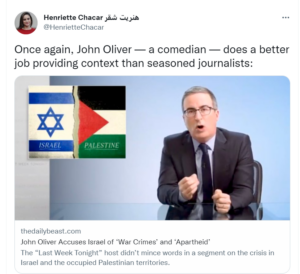Reuters can’t say it wasn’t warned about Henriette Chacar, the Jerusalem bureau reporter who earlier this month wrote a paean to Mahmoud Aleiwat, the 13-year-old Palestinian terrorist who shot two Israelis, one of who is still fighting to live (“Palestinian attacker dreamt of being a chef before attack, teachers say, Feb. 3″).
 For anyone who cared to look, all the signs were plainly visible that this particular journalist would be a problematic fit for a news organization guided by Trust Principles committed to preserving “independence, integrity, and freedom from bias.” Given that Chacar had explicitly denounced journalistic objectivity when it comes to the Israeli-Palestinian conflict, it was apparent long before her first Reuters article appeared in late January 2022 that, at best, maintaining impartiality would be a constant battle with the young journalist.
For anyone who cared to look, all the signs were plainly visible that this particular journalist would be a problematic fit for a news organization guided by Trust Principles committed to preserving “independence, integrity, and freedom from bias.” Given that Chacar had explicitly denounced journalistic objectivity when it comes to the Israeli-Palestinian conflict, it was apparent long before her first Reuters article appeared in late January 2022 that, at best, maintaining impartiality would be a constant battle with the young journalist.
Chacar’s detour earlier this month into the “Hitler sometimes takes a nap” genre of reporting, in which she expounded on how the young killer had “a passion for football and an ambition to be a chef,” removes any doubts that Reuters’ principles are an untenable burden for Chacar.
When word reached CAMERA last year that Reuters had hired Chacar, raising serious concerns that the news agency missed — or overlooked — the readily available red flags, CAMERA reached out to senior officials at Reuters on Jan. 6, 2022, weeks before her first article appeared. In a detailed letter laying out Chacar’s problematic history, CAMERA wrote:
It has come to our attention that Henriette Chacar, a writer at two fringe publications far outside mainstream journalism — +972 and previously the Intercept — has been hired by Reuters’ Jerusalem bureau. While we have not been able to independently confirm Reuters’ hiring, I believe that her record — a record marked by partisan advocacy against a country she would be covering, and of openly celebrating the use of subjective, inflammatory language in news reporting — is so concerning that it warrants immediate attention and appropriate follow up.
While Ms. Chacar attended Columbia’s prestigious School of Journalism, her body of work — articles, podcasts and social media — are the very antithesis of the laudable principals of ethical, objective journalism enshrined in the century-old Code of Ethics of the Society of Professional Journalists, invaluable standards which no doubt guide Reuters.
“Distinguish between advocacy and news reporting,” exhorts SPJ. “Objectivity in today’s superheated political environment may be impossible, but impartiality should still be a reporter’s goal.” Ms. Chacar’s career is one huge embrace of hyperadvocacy. Her partisanship eschews objectivity and ethical news reporting, as she ceaselessly adopts the most extreme positions and smears Israel as a pariah state requiring elimination.
In one of many occasions calling for Israel’s dismantlement, Chacar wrote: “It is imperative that we shift from a peace-making system obsessed with resuming a distorted negotiation process, to a rights-based approach that aspires toward decolonization and accepts that Zionism and full civic equality [for Palestinians] are irreconcilable” (+972 magazine, July 2, 2019).
In an Op-Ed in the Washington Post, she negated the legitimacy of the Jewish state, condemning the two-state solution as “an outdated, irrelevant vision that ignores years of Israel’s de facto annexation and apartheid policies.”
Further advocating for Israel’s end, she hosted a three–part podcast advocating on behalf of the so-called “Right of Return” in which original Palestinian refugees along with their millions of descendants would flood Israel, a prospect which objective observers universally acknowledge is tantamount to the obliteration of the Jewish state. As President Obama had said:
. . . if we’re going to achieve a two-state solution the Palestinians are going to have to recognize that the right of return as they’ve understood it historically would extinguish Israel as a Jewish state and that’s not an option.
She has alleged what she sees as “the inherent injustice of Zionism,” demonization which, along with her calls for the Jewish state’s dismantlement, constitutes antisemitism under the International Holocaust Remembrance Alliance Working Definition of Antisemitism. Endorsed by dozens of countries, including the United States, the definition includes: “Denying the Jewish people their right to self-determination, e.g., by claiming that the existence of a State of Israel is a racist endeavor.”
Moreover, Ms. Chacar is explicit and outspoken in her conviction that the (false) notion that Israel is a pariah state should penetrate and shape mainstream media coverage. For example, asked in an interview whether Palestinians feel emboldened by the support for the (baseless) accusation that Israel is an “apartheid” state, Ms. Chacar responded enthusiastically about what she sees as an increasing freedom to defame Israel:
One of the ways that we’re feeling it is in what we’re being allowed to say in international news media, terms like “ethnic cleansing” and “settler colonialism” that were sanitized, both in edited print pieces and interviews and now we’re seeing them make it through the edits, which I think is a very interesting process, very exciting process that we’re able to use our own language to describe our reality. (London Review of Books podcast, May 21, 2021)
To that end, she praised comedian John Oliver’s vitriolic and unhinged diatribe on Israeli “apartheid” and “war crimes” as doing a “better job providing context than seasoned journalists.”
Her determined framing of news coverage through the warping lens of alleged Israeli apartheid, war crimes and ethnic cleansing has made her prone to reporting blatantly false claims. For instance, in the aforementioned London Review of Books podcast, she falsely alleged that Jewish and Arab citizens of Israel are segregated, and outrageously fabricated that walls separate the two populations in mixed cities:
…The Palestinians who weren’t expelled [in 1948] were placed under military rule until 1966. So even those who were able to stay in their homes were still treated differently, and this segregation continues to this day. It’s still quite visible in places like Lod and Ramle where there’s literally a separation wall dividing Palestinian communities from the Jewish ones.
She fairs no better on social media, where she tweeted the false charge that “Jewish militias threw a molotov cocktail at a Palestinian home in Jaffa, wounding two children and burning the house.” In fact, armed with scientific evidence, police arrested an Arab for the crime. The perpetrator mistook the Arab home for a Jewish home, as reported in Haaretz. Consistent with her modus operandi of consistently finding Israeli/Jewish culpability, facts be damned, Ms. Chacar did not apologize for the false charge or clarify that, in fact, it was an Arab rioter who violently attacked the home and injured the child
Similarly carried away by her enthusiasm for vitriol over sound reporting, she tweeted this inflammatory and inaccurate statement when Bethlehem was hit by covid early in the pandemic: “Israel’s Defense Minister Naftali Bennett has decided to place the entire Palestinian city of Bethlehem under siege, after several suspected cases of coronavirus were discovered there.”
In fact, as Reuters reported about Bethlehem’s coronavirus closure in March 2020 (“Bethlehem deserted after Palestinians declare coronavirus emergency“):
Palestinian President Mahmoud Abbas announced the 30-day measure across the occupied West Bank on Thursday after seven coronavirus cases were found in Bethlehem among hotel workers thought to have caught it from tourists.
Indeed, Israel and the Palestinian Authority jointly decided to close Bethlehem to stem the coronavirus’ spread. But Ms. Chacar’s pathological antipathy impedes her ability to report fairly and accurately on anything concerning Israel. Therefore, a collaborative decision to impose a health-related closure is twisted into an Israeli “siege,” with all its nefarious implications in the charged Israeli-Palestinian context.
Even if she possesses the ability to practice ethical journalism despite her deep appreciation for partisan reporting, Ms. Chacar lacks the will to do so, as she herself makes plainly clear.
In a prescient January 2020 CNN interview about the state of journalism and democracy, Ted Koppel keenly observed: “I think it is too easy for people to quite literally sort of divide the press down the middle and establish quite easily who is for and who is against. And I think that is troublesome because it means that we have lost our capacity to be viewed as objective observers.”
Lamenting the growing phenomenon in which leading mainstream reporters freely express their personal opinions, Koppel fretted about the future of American democracy. “I think that democracy requires, desperately needs what are widely perceived by people of all political stripes as objective sources of news,” remarked the celebrated, veteran journalist. The abandonment of objective sources risks deep polarization, leading to widespread mayhem and chaos, Koppel warned, essentially predicting the Capitol riots.
Ms. Chacar proudly wears her partisanship on her sleeve, loudly broadcasting her extremist views in every tweet, article and podcast. She publicly repudiates objective reporting, spitting in the face of SPJ’s essential ethical journalism in the service of “public enlightenment as the forerunner of justice and the foundation of democracy.” Ms. Chacar’s very public record of extremist, anti-Israel advocacy undermines the credibility not only of her own reporting, but also that of any mainstream media outlet which employs her.
On the one-year anniversary of the Capitol riots which Koppel so sagely anticipated, we strongly urge Reuters to recommit to ethical, objective journalism, and to reject advocacy journalism. To that end, if Reuters has indeed hired Ms. Chacar, we fervently hope that the news agency will reconsider her fitness to work in the field of ethical journalism, democracy’s safeguard.
Unfortunately, Reuters failed to pay heed to Chacar’s voluminous trail of disqualifying content, which CAMERA assembled for Reuters’ benefit. Without relating to any of the detailed content of her long and sordid assault against both Israel and against journalistic ethics, Reuters officials responded only that “Reuters journalists must adhere to our Trust Principles, which ensure integrity, independence, and freedom from bias in the gathering and dissemination of news.”
Meanwhile, The Jewish Chronicle revealed last week that last year Chacar wrote to Jeffrey Heller, then Editor-in-Charge of Reuters’ Jerusalem bureau: “Can we conclusively say that Palestinians have mostly targeted civilians?”
She pressed on: “Many Israelis are either in active or reserve duty, and with the prime minister encouraging citizens to carry their guns, the line between civilians and combatants is quite blurred, so I do think it’s a tricky thing to highlight. It also seems redundant, since we already outline the number of Israeli civilians and security forces killed.”
When Heller, now retired, responded that that line of thinking was “outrageous,” Chacar persisted:
If we are going to explain Israel’s raids to readers by presenting them as a response to something, I think it’s crucial that we also contextualise Palestinian attacks.
Perhaps something along the lines of: Israel says it conducts raids in Palestinian towns and villages to thwart “terror” attacks. Palestinians say their armed struggle is a legitimate form of resistance to decades of Israeli occupation.
Chacar’s comments to her editor advocating on behalf of terror attacks against Israeli civilians did not affect her ongoing employment at the news organization.
This month’s journalistic abomination about the aspiring young chef who wanted to be like Messi was the inevitable outcome of the news agency’s failure to rein in the young journalist committed to opposing ethical journalism.
With research by Ricki Hollander

